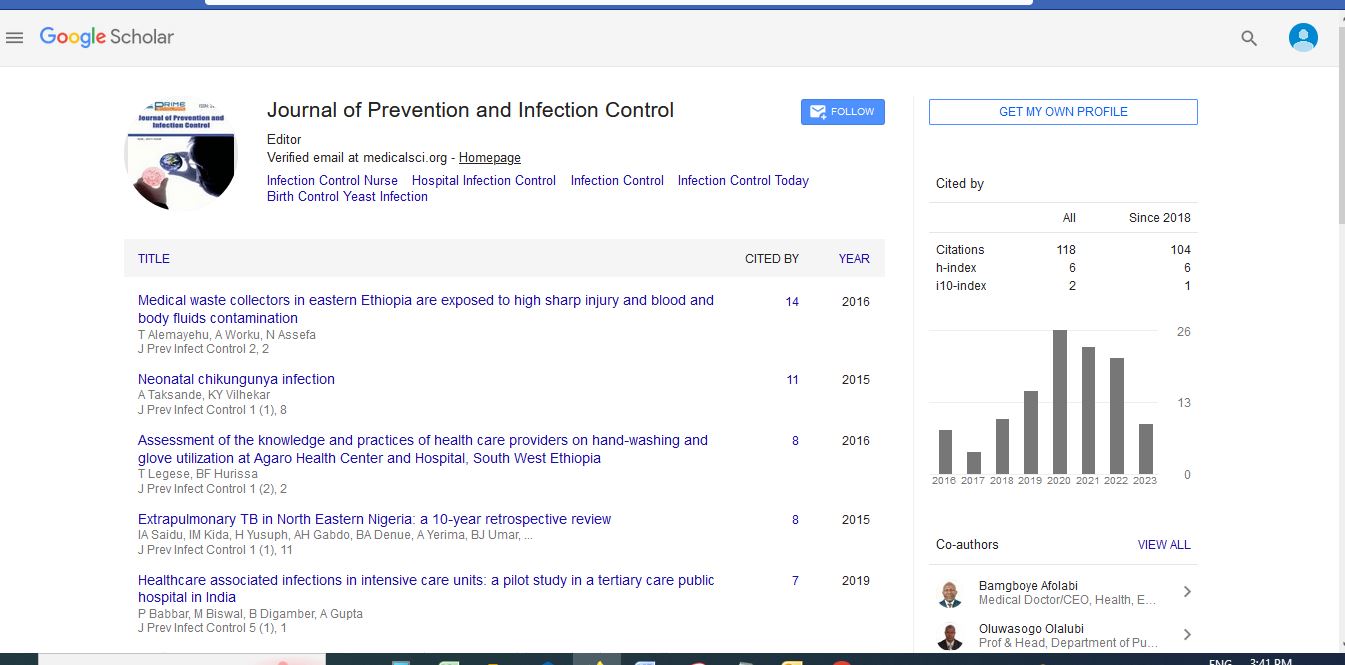Perspective - (2024) Volume 10, Issue 2
Immunization: Protecting Health Through Vaccination
Mason Harris*
Department of Medical Science, New York University, USA
*Correspondence:
Mason Harris,
Department of Medical Science, New York University,
USA,
Email:
Received: 29-May-2024, Manuscript No. IPJPIC-24-20119;
Editor assigned: 31-May-2024, Pre QC No. IPJPIC-24-20119 (PQ);
Reviewed: 14-Jun-2024, QC No. IPJPIC-24-20119;
Revised: 19-Jun-2024, Manuscript No. IPJPIC-24-20119 (R);
Published:
26-Jun-2024, DOI: 10.36648/2471-9668-10.2.18
Introduction
Immunization is the process of administering vaccines to provide
immunity against specific diseases. It strengthens the body’s
immune response, reducing the risk of infection and contributing
to public health protection globally. Immunization stands as one of
the most effective and cost-efficient public health interventions,
saving millions of lives each year by preventing the spread of
infectious diseases. By stimulating the body’s immune system
to recognize and fight off harmful pathogens, vaccines confer
immunity against a wide range of diseases, reducing illness,
disability, and death. In this article, we explore the significance
of immunization, its impact on global health, and the importance
of vaccine accessibility and education. Immunization plays a
pivotal role in disease prevention and control, offering protection
against a myriad of infectious diseases, including measles, polio,
diphtheria, tetanus, pertussis, influenza, and hepatitis.
Description
Vaccines stimulate the production of antibodies and memory
cells, priming the immune system to recognize and respond
rapidly to specific pathogens, should exposure occur in the future.
This immune response not only prevents illness in vaccinated
individuals but also contributes to herd immunity, thereby
protecting unvaccinated or immunocompromised individuals
within the community. The impact of immunization on global
health cannot be overstated. Vaccines have been instrumental
in eradicating or significantly reducing the burden of many
once-common diseases. For instance, the global eradication of
smallpox in 1980 stands as a testament to the power of vaccines
and international collaboration. Additionally, vaccination
campaigns have brought us to the brink of eradicating polio, with
only a handful of cases reported annually in a few remaining
endemic countries. Furthermore, immunization has contributed
to substantial reductions in child mortality rates worldwide.
Vaccination against childhood diseases such as measles,
pneumonia, and diarrhoea has saved millions of lives, particularly
in low- and middle-income countries where access to healthcare
services may be limited. Despite the undeniable benefits of
immunization, significant disparities persist in vaccine access
and coverage rates globally. Millions of individuals, primarily
in low-resource settings, lack access to essential vaccines due
to factors such as poverty, weak healthcare infrastructure, and
vaccine supply chain challenges. Ensuring equitable access
to vaccines requires concerted efforts from governments,
international organizations, pharmaceutical companies, and civil
society. Initiatives such as the Global Alliance for Vaccines and
Immunization (GAVI) and the Vaccine Alliance aim to expand
access to vaccines in underserved regions, improve vaccine
delivery mechanisms, and strengthen immunization programs.
Despite overwhelming scientific evidence supporting the safety
and efficacy of vaccines, misinformation and vaccine hesitancy
remain significant barriers to achieving high immunization
coverage rates. Debunked myths and misinformation propagated
through social media and other channels have fueled vaccine
hesitancy, leading to outbreaks of vaccine-preventable diseases
in some communities.
Conclusion
Addressing vaccine misinformation requires comprehensive
education and communication efforts to promote accurate,
evidence-based information about vaccines and their benefits.
Healthcare providers, public health agencies, educators,
and community leaders play a crucial role in disseminating
reliable information, addressing concerns, and fostering trust
in vaccination. Immunization stands as a cornerstone of public
health, offering unparalleled protection against infectious
diseases and saving countless lives worldwide. By ensuring
widespread access to vaccines, combating misinformation, and
promoting vaccine education, we can further harness the power
of immunization to build healthier, more resilient communities
and achieve the ultimate goal of disease prevention and control.
Investing in immunization today is an investment in a healthier
and brighter future for generations to come.
Citation: Harris M (2024) Immunization: Protecting Health through Vaccination. J Prevent Infect Control. 10:18.
Copyright: © 2024 Harris M. This is an open-access article distributed under the terms of the Creative Commons Attribution License, which permits unrestricted use, distribution, and reproduction in any medium, provided the original author and source are credited.

